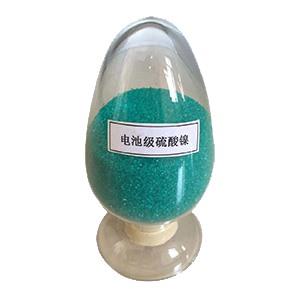Frequently Asked Questions about Using Battery Grade Nickel Sulfate
Battery Grade Nickel SulfateHealth Hazards: Inhalation can irritate the respiratory system. Can lead to increased eosinophils in the lungs, which can lead to bronchitis. Eye irritation. Skin contact can cause skin irritation and eczema, often accompanied by marked itching, known as "nickel" Itching". Many can cause nausea, vomiting and dizziness when taken internally.
Pollution of the environment: Harmful to the environment and may cause environmental pollution to the atmosphere.
EXPLOSION HAZARD: This equipment is non-flammable and irritating.
Battery Grade Nickel Sulfate Nickel Sulfate
first aid
Skin Contact: Remove environmentally polluting clothing and cleanse skin thoroughly with soap and water.
Eye contact: mention eyelids, rinse with running water or saline. Seek medical advice.
Inhalation: Put it into an area with fresh gas on the spot. If breathing is difficult, seek medical attention for oxygen supply.
Ingestion: Drink plenty of warm water to induce vomiting. Stomach lavage, drainage. Seek medical advice.
Fire Safety Countermeasures
Hazardous characteristics: After high thermal decomposition, it will form harmful sulfate smoke.
Substances hazardous to ignite: Sulfur oxides.
Fire fighting method: firefighters must wear fire-resistant and anti-virus clothing, and put out the fire from an upwind angle. When fighting fire, please try to move the container from the fire to an open place.
Leak emergency treatment
Emergency solution: Isolate the spilled environmental pollution area and limit access. It is recommended that emergency personnel wear dust masks (full face masks) and protective clothing. Wash with plenty of water, and pour the wash water into the sewage system after dilution. If there is Many spills, collect them together for recycling, or transport them to a waste disposal site for disposal.
actual operation storage
Common problems and precautions in practical operation: closed practical operation, improve natural ventilation. Practical operators must accept unique learning and training, and strictly implement operation procedures. It is recommended that operators wear self-priming filter dust masks and organic chemical safety glasses , protective clothing and rubber gloves. Prevent dust formation. Prevent contact with oxidizing agents. When handling, handle with care to avoid damage to packaging and containers. Equipped with emergency release equipment. Empty containers may be hazardous residues.
Common problems and precautions for battery grade nickel sulfate storage: Store in a cool and naturally ventilated warehouse. Keep away from fire and heat sources. It should be kept away from oxidants and do not need to be stored together. The storage area should be equipped with suitable materials to prevent leakage.


